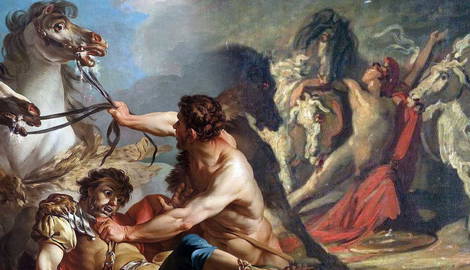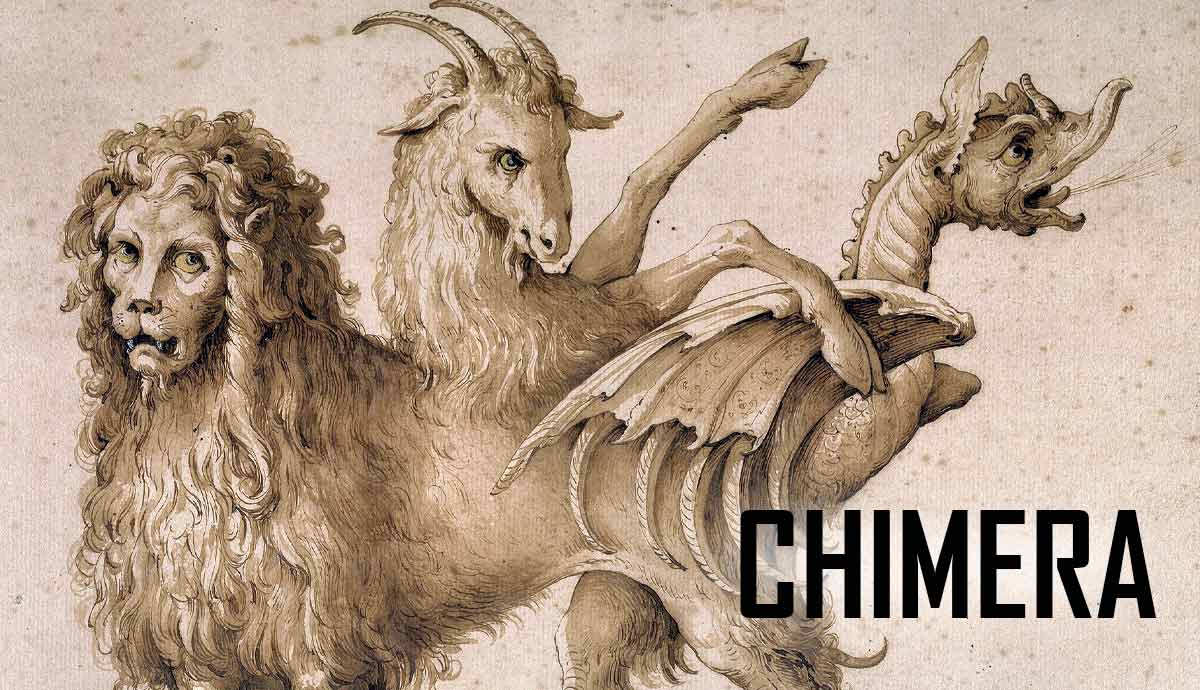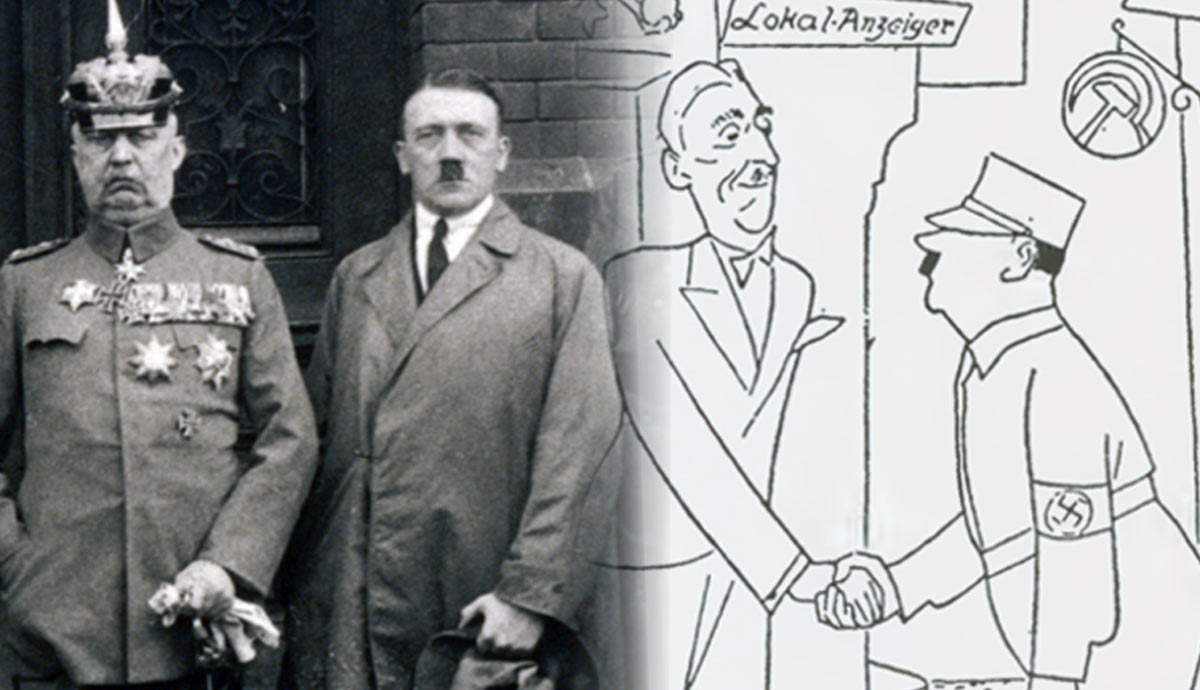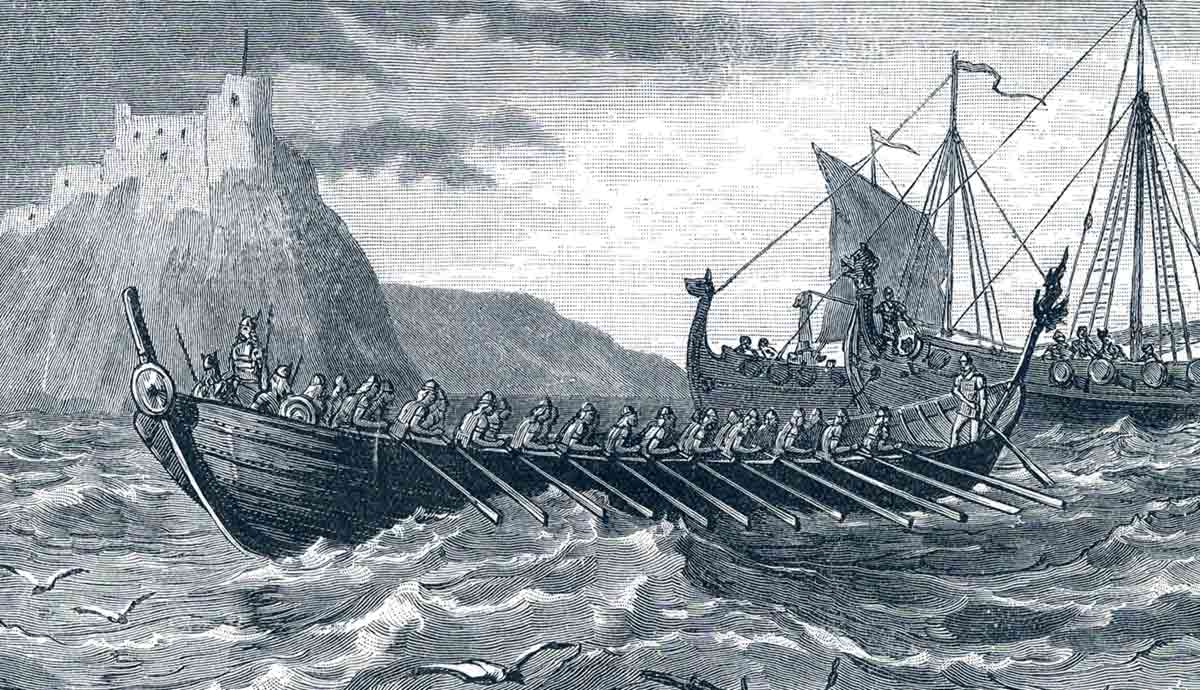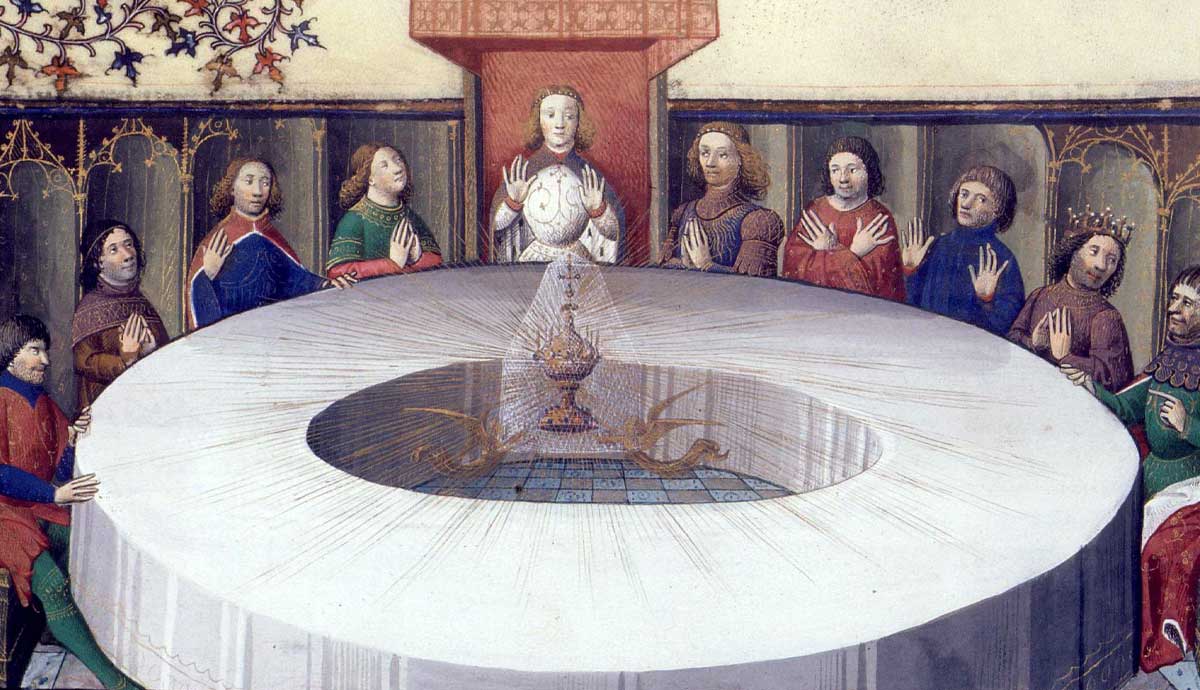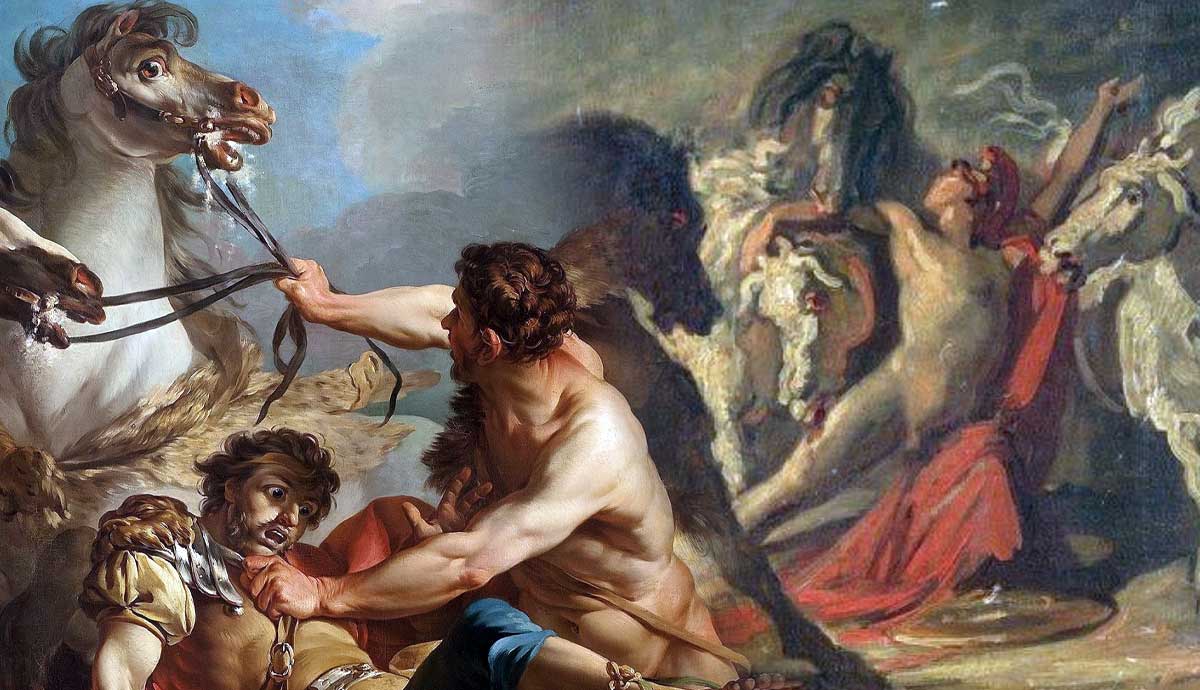
Eurystheus commanded Heracles to steal the Mares of Diomedes for his eighth labor. Diomedes was a tyrannical Thracian King who enjoyed feeding his enemies to his four mad, fire-breathing horses. On his journey to Thrace, Heracles visited his old friend Admetus, the King of Pherae, and later met Abderus, the son of Hermes, who joined Heracles on his mission. Both men experienced tragedy, but Heracles wrestled death for one and immortalized the other. Keep reading to discover how Heracles stole the Mares of Diomedes and what happened to his friends.
A Heroic Theft

Throughout Heracles‘s Labors, King Eurystheus set nearly impossible challenges, hoping the hero would either fail or perish. However, the accomplishment of all the labors also brought benefits to Eurystheus and his kingdom. The unkillable monsters Eurystheus set Heracles against were a genuine threat to the King and his citizens. To exploit Heracles’s hero status, Eurystheus sent him to deal with issues plaguing other Greek rulers. Heracles’s growing fame and admiration from Eurystheus’s subjects began troubling the King. He took measures to limit Heracles’s activities within the Peloponnese, fearing the hero’s popularity could undermine his rule.
For his eighth labor, Heracles was tasked by the King to journey to the savage lands of Thrace in the far north and steal the Mares of Diomedes. This was not a simple mission of horse theft; it was a formidable challenge. Heracles had to navigate wild, unfamiliar lands, avoid the wrath of King Diomedes and his army of Thracian warriors, and outsmart or outfight an entire Kingdom.
Every successful heist needs a fair amount of deception but relies on accurate intel about the target. Before embarking on his long journey to the far north, Heracles received information from Eurystheus about the horses he was tasked to steal. He was told about the number of horses, their impressive speed, and their location in Thrace. However, Eurystheus conveniently omitted some crucial details: the mares could breathe fire and were plagued by a violent madness that could only be momentarily subdued by feeding them human flesh. Unaware of the true nature of his assignment, Heracles set out on his lengthy journey north, deciding to make the most of it by visiting an old friend who lived along the way.
King Diomedes and His Mad Mares

The region of Thrace, which encompasses modern northern Greece, southeastern Bulgaria, and European Turkey, was home to various societies and Kingdoms. However, the ancient Greeks tended to perceive all Thracians as a single homogeneous group, whom they considered to be uncivilized and uncultured barbarians. The Thracians were known for their remarkable bravery and prowess in battle but were seen as lacking in other aspects of civilized life. The Greeks believed that Thrace was the birthplace of Ares and that the god of war was the patron deity of the Thracians.
Diomedes was the King of the Bistones, a Thracian group living along the Black Sea’s shores. He was the son of Ares and a mortal princess named Cyrene. Diomedes seemed to have inherited his father’s love of violence and pain. The Thracian King was known for his sadistic tendencies and was feared and hated by his subjects for his harsh taxation and authoritarian rule. Anyone who opposed the King was brought to Tirida, the capital city, and fed alive to Diomedes’s beloved horses.

The origins of Diomedes’s fierce fire-breathing horses, how he acquired them, and what caused their madness are shrouded in mystery. Some believe that Ares gave the horses to Diomedes when he became King and that their madness resulted from being continuously fed human flesh by the king.
The names of all four horses have been passed down: Podargos (swift), Lampon (shining), Xanthos (yellow), and Deinos (terrible). The mares were tall, almost gigantic creatures with snow-white coats and manes of yellow and brown. They were swift and elegant animals that Diomedes would use to pull his chariot. Their madness made them extraordinarily aggressive and restless, making them genuine nightmares for those who came too close to them. To control them, the horses had to be restrained with heavy iron chains to a bronze trough and would only calm down once they ate human flesh.
Heracles’s Detour: The Good Doctor

It took Heracles several weeks to travel from Tiryns in the Peloponnese to Diomedes’s capital of Tirida. The journey took him across nearly all of mainland Greece so he stopped and rested at the homes of close friends along the way. One of his pitstops was with Admetus and Alcestis, the King and Queen of Pherae in Thessaly. This seemingly innocent social visit would see Heracles accomplish one of his most impressive feats, arguably more impressive than many of the labors undertaken for Eurystheus. When Heracles arrived in Pherae, the city and its ruler were mourning. The city’s sorrow could be traced to a tragedy that had unfolded several years ago. It all began with a man named Asclepius, the humble doctor who dared to defy death.
Asclepius was the son of Apollo and a mortal woman named Coronis. Shortly after Asclepius’s birth, Apollo sent him to be raised by Chiron, the legendary Centaur, healer, and teacher of heroes. Under Chiron’s guidance, Asclepius became a renowned healer and surgeon.
After befriending a snake that cleared his ears, Asclepius gained access to new divine knowledge that helped him invent groundbreaking methods for healing the sick and dying. He created a medicine using the blood of the Gorgon Medusa (gifted to him by Athena) that could cure all ailments and even bring the dead back to life. This death-defying elixir angered the gods, especially Hades. The lord of the underworld argued that Asclepius’s resurrection medicine made light of death itself and disrupted the balance between life and death. Zeus agreed with Hades and did not like the idea of a mere mortal possessing such power. So, the King of the Olympians struck Asclepius with a thunderbolt, ending his life and any future use of his death-defying medicinal knowledge.

Apollo, the god of healing and knowledge, was furious at Zeus’s decision to kill his favored son, Asclepius, who only sought to help and heal the world. Apollo could not take revenge on Zeus, the King of the gods, for what happened to his son. Instead, Apollo decided to shoot the messenger and entered Hephaestus’s forge, killing the three Cyclopes—Brontes, Steropes, and Arges—responsible for crafting Zeus’s thunderbolts. Apollo’s insubordination did not go unpunished. Zeus banished Apollo from Olympus and sentenced him to serve as a herdsman for the mortal King Admetus of Pherae for either one or nine years.
Heracles Detour: The Mortal King and the Immortal Herdsmen

Zeus chose Admetus because the young King was renowned for his hospitality, a quality favored by the lords of Olympus. Admetus was naturally charming and kind-hearted, and Apollo’s exile was more of a pleasure than a punishment. The two got along well and even became lovers. As a herdsman, Apollo ensured all Admetus’s cattle gave birth to twins, significantly increasing his herd and wealth.
After Apollo’s exile ended, the two remained close friends. Apollo even helped Admetus find his wife, the beautiful Princess Alcestis, the daughter of King Pellas of Iolcos. Alcestis’s charm and beauty attracted many suitors, so King Pellas organized a challenge: the person who could successfully harness a boar and a lion to a chariot would win his daughter’s hand in marriage. With Apollo’s assistance, Admetus harnessed the boar and lion, securing Alcestis’s hand in marriage, and the two were soon happily wed.

Admetus had become Apollo’s best friend, and the immortal Olympian began to fear the day Admetus would die. Apollo sought a way to make Admetus immortal. Instead of asking Zeus, he approached the Moirai, the sisters of fate. Apollo charmed the three sisters, got them drunk, and eventually made a deal with them. The Moirai agreed to grant Admetus immortality on the condition that another mortal willingly choose to die in his place. When Apollo told his friend about the deal, Admetus tried to find someone willing to take his place. However, he was rejected by his elderly father and everyone else he thought of.
In the end, his loving wife, Alcestis, chose to die in his stead. Admetus had never considered immortality, but now that it was possible, he became obsessed with attaining it and accepted his wife’s decision without a second thought. Yet, when Alcestis sacrificed her life to secure his immortality, Admetus realized how much he loved his wife and that a life without her was not worth living. Moments after Alcestis’s death and Admetus’s devastating epiphany, Heracles arrived at Admetus’s palace gates, eager to catch up with his favorite royal couple.
Heracles’s Detour: Wrestling With Death

Despite just losing the love of his life, Admetus greeted his old friend Heracles. Admetus offered Heracles the generous hospitality that the King of Pherae was renowned for. Heracles immediately sensed that something was amiss. The palace staff were somber, as was Admetus, who was not his usual charming self, and Alcestis was nowhere to be found.
Admetus brushed off Heracles’s questions and ensured the hero had a splendid meal and a wonderful stay at his home. However, after enjoying a delicious meal and partaking in many cups of wine, Heracles discovered the cause of the solemn mood in the palace. He felt like a heartless oaf for bothering his dear friend during his time of mourning.
Heracles felt guilty for taking advantage of Admetus’s hospitality while his host was grieving, so he vowed to journey to the underworld and rescue Alcestis to repay Admetus for his generosity. Before embarking on this new epic detour, Heracles visited Alcestis’s tomb to pay his respects and honor her memory.
It seems that the fates who orchestrated the deal that resulted in Alcestis’s death smiled upon Heracles that day. As Heracles entered her tomb, he met Thanatos, the embodiment of death, who had come to escort Alcestis’s soul to the underworld. Without hesitation, Heracles tackled Thanatos and wrestled with death, demanding he agree to release Alcestis.

Admetus ensured Heracles was well taken care of, but in his current mood, he could not stand being around anyone, especially someone as energetic and cheerful as Heracles. The King secluded himself in his bedroom, instructing his servants to leave him alone and not allow anyone to enter. When Admetus heard Heracles banging on his door, enthusiastically demanding to see him, he struggled to maintain politeness, resisting the urge to tell his friend to leave. Admetus mustered up what little energy he had left to be a good host and opened the door. To his surprise, Heracles was not alone. Standing beside the smiling hero, just wrestled away from the clutches of Death himself, was his beloved wife, Alcestis.
Admetus tearfully thanked Heracles for defying death and correcting the King’s mistake of selfishly desiring immortality. After wrestling with Death and reuniting the royal couple, Heracles did not stay long. He left Admetus and Alcestis to enjoy each other’s company and, suitably rested thanks to his host’s exceptional hospitality, continued his journey to Thrace.
Stealing the Mad Mares of Diomedes

On the long road from the palaces of Admetus and Alcestis to Thrace, Heracles became friends with a young man named Abderus, a son of Hermes. As they journeyed north, Heracles and Abderus became lovers. As the son of the god of thieves, Abderus proposed to aid Heracles in stealing Diomedes’s mares.
Heracles’s plan to steal the wild mares of Diomedes was simple: first, secure the horses; second, lead the mares out of the palace; and finally, defeat any Thracians who tried to stop steps one and two.

With the help of Eurystheus’s information, Heracles quickly located the horses and easily overpowered the stable guards. He then shattered the horses’ iron chains and, with the assistance of Abderus, guided them to the nearby coast. However, their actions did not go unnoticed. Diomedes’s citadel was soon on high alert, with the King mobilizing his army to search for the thieves who had taken his prized horses.
Heracles entrusted the horses to Abderus and confronted Diomedes and his army. After slaying literal monsters, an army of men was barely a challenge for Heracles. After a lengthy fight with Diomedes, a formidable son of war, the hero defeated his entire army and captured the Thracian King alive.
However, Heracles had never been told of the horses’ violent nature, ability to breathe fire, and preference for human flesh. While Heracles was engaged in battle, the horses breathed out hot flames, roasting poor Abderus before tearing him asunder and devouring him.

When Heracles returned after defeating Diomedes and his army, he found what little remained of his dear friend and lover. Enraged, Heracles fed Diomedes to his horses to avenge Abderus’s death. After eating Diomedes, the horses became permanently calm. It appeared that the cure for their madness was the vile flesh of their sadistic master. The horses’ newly docile demeanor allowed Heracles to handle them easily. Before leaving Thrace, Heracles buried Abderus’s remains. Next to Abderus’s tomb, Heracles founded a city named Abdera, immortalizing his friend’s memory.
There are multiple versions of the myth concerning how Heracles stole Diomedes’s wild mares. Although the details vary, the main narrative remains consistent. In every version, Abderus and Diomedes are devoured, but the methods by which Heracles overcomes Diomedes differ.
In one version, Heracles is assisted by a small army of followers who help him defeat Diomedes’s forces. In another account, Heracles avoids an assassination attempt by staying awake all night before releasing the horses and vanquishing the Thracian King. In a different retelling, Heracles defeats Diomedes by taking the horses to a nearby peninsula, where he digs a trench that transforms the peninsula into an island and causes flooding. The flood impedes Diomedes and his army, forcing them to retreat, which allows Heracles to beat them.

Now that the horses were permanently submissive, Heracles harnessed them to a chariot and promptly drove them back to Eurystheus in the Peloponnese. It is unclear how King Eurystheus reacted when Heracles arrived with the four allegedly wild Mares of Diomedes. It is also uncertain what the King decided to do with them.
In one version, Eurystheus dedicates the mares to Hera and breeds them with his own thoroughbreds. Supposedly, one of the descendants of this line of horses was Bucephalus, the much-loved steed of Alexander the Great. In another version, Eurystheus released the horses, and they roam freely around Argos until they die. In another account, Eurystheus sent the mares to Mount Olympus to be sacrificed in honor of Zeus, but the King of Olympus refused them and sent bears, wolves, and lions to kill the mares.
After successfully capturing the wild Mares of Diomedes, Heracles awaited new orders from Eurystheus. However, to his surprise, it was not the King who approached, but Eurystheus’s daughter, Princess Admete, who seemed all too ready to command the hulking hero. Bemused and intrigued, Heracles turned to the young princess to await instructions for his ninth labor: to obtain the girdle of Hippolyta, the queen of the Amazons.
